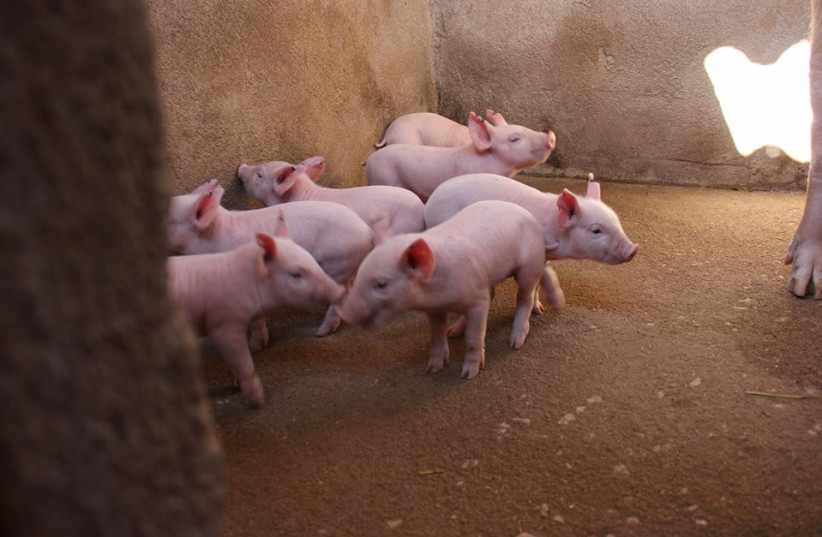Last month, doctors in Maryland completed the world’s first heart transplant using a heart that came from a genetically modified pig. This was a breakthrough because the donor pig had undergone gene editing to remove a specific type of sugar from its cells thought to be responsible for previous organ rejections in patients.
This was the latest triumph in the burgeoning field of cross-species organ transplants, known as xenotransplantation. Other recent experiments include testing the use of pig kidney transplants on brain-dead bodies that had been donated to science.
Pigs have been utilized for a number of reasons: they are easy to breed and maintain (albeit with some environmental costs); they are available in wide numbers; they can be bred under pathogen-free conditions; and, most importantly, they are similar in anatomy and physiology to humans.
While researchers still have a way to go, these promising developments raise the question of whether Jewish law supports using this technology, given the taboo against pigs in Jewish culture.
WITHIN THE Bible, the pig is singled out because it has split hooves but does not chew its cud, thereby disqualifying it from being kosher food. “And the swine – although it has true hoofs, with the hoofs cleft through, it does not chew the cud: it is impure for you. You shall not eat of their flesh or touch their carcasses; they are impure for you” (Leviticus 11:7-8).

The Bible prohibits eating this animal while further noting that one can become “impure” from handling its flesh. The latter regulation, however, applies only to matters of ritual purity that were germane when the Temple stood in Jerusalem, but has little ramifications for contemporary practice.
Beyond the prohibition of eating pork, the sages also decreed that it is prohibited to raise pigs in Israel or around the world. Maimonides asserted that this was because wild pigs cause much environmental and property damage. Yet the sages also went further to assert, “Cursed is he who raised pigs,” reflecting a deep-seated disgust toward this animal.
In antiquity, pork was a staple of the diets of the region, making the Jewish prohibition against eating it a symbol of Jewish separatism. During the period of the Maccabees, Greek rulers are seen as trying to force Jews to ingest swine, symbolizing foreign domination. Over time, the animal was also tied to Rome, which defiled the Temple by placing a pig in its sanctuary. In Jewish literature, pigs are frequently referred to as “that thing” (oto davar), indicating our disdain to even mention its name.
This strong cultural taboo was enacted into Israeli law in 1962 when the Knesset banned the sale of pork. As Supreme Court Justice Daphne Barak-Erez has shown, this legislation was passed out of a broader sense of cultural heritage and not religious coercion. Exceptions, however, were made, allowing for pigs to be raised in certain cities, particularly in areas of the Galilee with strong Christian populations. In more recent years, because of increased demand for pork (particularly from immigrants from the former Soviet Union) as well as basic laws protecting freedom of occupation, this taboo has somewhat waned, with pork readily available in many Israeli cities.
Yet despite the prohibition of consuming pork as well as the general taboo around pigs, there was never a ritual prohibition from gaining benefit from pigs. In fact, according to some figures, it would be permissible for Jews to give pork to their non-Jewish workers or to serve as middlemen in selling such food. There is certainly no prohibition of benefit for nonconsumption purposes, and all the more so when a pig product is used for medicinal purposes. The value of saving lives would even trump the prohibition of consuming pork itself!
For this reason, as bioethicist Dr. Fred Rosner has noted, Jews have never had a problem utilizing porcine heart valves, insulin from pork, or transplanted pigskin to treat severe burns (xenografting).
Unfortunately, in popular culture, Jews are sometimes errantly portrayed as banning pig products at all costs. Thus on an infamous episode of the popular show Grey’s Anatomy, an Orthodox Jew refuses a lifesaving porcine valve and gets saved only once a cow substitute is found. This horrible misrepresentation was rightly condemned.
It remains critical that Jews and non-Jews do not exaggerate certain cultural taboos to the point that they compromise more critical religious values such as preserving health. If xenotransplants from pigs can help save lives, then it is important for this route to be explored and utilized.
ALL THIS being said, some ethicists have raised questions about whether the genetic manipulation of animals might begin to blur the line between humans and animals.
John Loike and Alan Kadish of Touro College, for example, have argued that the mixing of human and animals brain cells raises particularly profound questions because the brain goes to the essence of personal and human identity.
To my mind, these are important questions that should always be asked both before and during these types of pathbreaking experimentation. That shouldn’t stop this research, but we must always ask deep questions about the implications of these explorations.
It also behooves us to remember that the shortage of hearts, lungs, and other critical organs would be greatly alleviated by more people signing organ donor cards like the ADI card in Israel. A broad range of rabbinic authorities, led by Israel’s chief rabbinate, supports posthumous organ donation.
More information on this lifesaving mitzvah can be found via the Halachic Organ Donor Society (hods.org).■
The writer is the co-dean of the Tikvah Online Academy and a postdoctoral fellow at Bar-Ilan University Law School. His book A Guide to the Complex: Contemporary Halakhic Debates, won the National Jewish Book Award.
